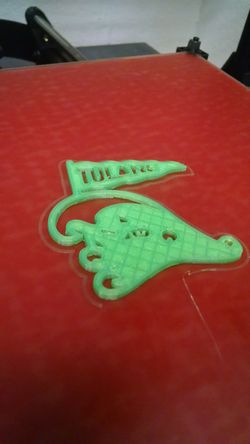3D Printing: Difference between revisions
No edit summary |
No edit summary |
||
| Line 1: | Line 1: | ||
[[File:3dprintexample.JPG|250px|thumb|right|Example of a 3D print on the [[LulzBot TAZ 5]], immediately after completion]] | [[File:3dprintexample.JPG|250px|thumb|right|Example of a 3D print on the [[LulzBot TAZ 5]], immediately after completion]] | ||
3D printing is a modern rapid prototyping technique in which a solid object is created through a layered deposition process. 3D printing is referred to as an "additive manufacturing" technique, as instead of taking material away from a stock piece in order to create a desired object, such as in milling or turning manufacturing techniques, the material for the object is added by the printing process. 3D printing techniques make it very simple to quickly create both complex and simple objects. | 3D printing is a modern rapid prototyping technique in which a solid object is created through a layered deposition process. 3D printing is referred to as an "additive manufacturing" technique, as instead of taking material away from a stock piece in order to create a desired object, such as in milling or turning manufacturing techniques, the material for the object is added by the printing process. 3D printing techniques make it very simple to quickly create both complex and simple objects. | ||
| Line 13: | Line 11: | ||
== Available 3D Printers == | == Available 3D Printers == | ||
For information on safety and [[PPE]] requirements for each machine in the MakerSpace, see the [[Job Hazard Analysis]] forms. | |||
[[Ultimaker 2]] | [[Ultimaker 2]] | ||
<br/> | <br/> | ||
Revision as of 21:18, 28 January 2017

3D printing is a modern rapid prototyping technique in which a solid object is created through a layered deposition process. 3D printing is referred to as an "additive manufacturing" technique, as instead of taking material away from a stock piece in order to create a desired object, such as in milling or turning manufacturing techniques, the material for the object is added by the printing process. 3D printing techniques make it very simple to quickly create both complex and simple objects.
The 3D printers available in the MakerSpace are all Fused Filament Fabrication (FFF) printers, meaning that to create the desired part, molten polymer (melted plastic) is "extruded" into a thin molten filament, which is deposited in the desired shape. The hot plastic fuses with previously deposited layers, creating the desired part. Due to the nature of molten plastic, FFF 3d printed parts have a degree of "slop" that is difficult to eliminate, so a different manufacturing technique, such as laser cutting or CNC Routing/Milling, is likely necessary for parts that require very high degrees of accuracy.
The Tulane MakerSpace contains Ultimaker 2 and LulzBot TAZ 5 3d printers with heated beds to allow for both ABS and PLA printer filament. ABS filament allows for better finishing effects (such as smoothing), but PLA provides a more rigid part and has has much better adherence to the print bed. There are other advantages and disadvantages to both. Cost is the same (currently ~$18 per kg).
While ABS and PLA are the most commonly used filaments, many other products exist with special qualities (flexible) or appearance (wood, ceramic). There is a good summary and comparison at MatterHackers. MakerSpace users wishing to try out these filaments should procure them and work with a ninja to load them onto the printer.
The standard slicing software favored for these printers is Cura, which allows you to arrange and size your model and set options for the printer to follow. The LulzBot version of Cura is recommended, as it contains more features, and works with both the TAZ 5's and the Ultimaker 2: https://www.lulzbot.com/cura
Available 3D Printers
For information on safety and PPE requirements for each machine in the MakerSpace, see the Job Hazard Analysis forms.
Ultimaker 2
LulzBot TAZ 5
AutoDesk Ember
FlexyDually Extruder TAZ 5
Recommended Print Configurations
Ultimaker 2 Print Configurations
LulzBot TAZ 5 Print Configurations
FlexyDually Extruder TAZ 5 Print Configurations
3d Printing Problems
Simplify 3D has created an extremely helpful Print Quality Troubleshooting Guide.
RepRap also has a helpful wiki which contains a Print Troubleshooting Pictorial Guide.